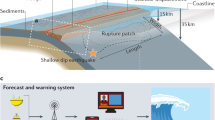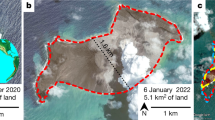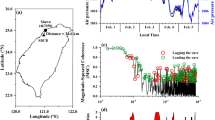Abstract
ON May 16, 1968, at 00 h 48 min 55 s, there was a strong earthquake off the east coast of Honshu, Japan. According to the US Coast and Geodetic Survey (USCGS) large tsunami tidal waves were set up which caused the loss of ninety-five vessels and reached a height of 4.5 m at Mikayo. On land, 18,500 houses were reported destroyed or damaged. Although the resultant casualties, forty-seven killed and 281 injured, were relatively light, the mean surface wave magnitude MS = 7.9 assigned to the earthquake by the USCGS classifies it as an important seismic event.
This is a preview of subscription content, access via your institution
Access options
Subscribe to this journal
Receive 51 print issues and online access
$199.00 per year
only $3.90 per issue
Buy this article
- Purchase on Springer Link
- Instant access to full article PDF
Prices may be subject to local taxes which are calculated during checkout
Similar content being viewed by others
References
Hutchins, W. H., Rad. Electron. Eng., 31, 293 (1966).
Grover, F. H., Geophys. J. Roy. Astro. Soc., 16 (1968).
Donn, W. A., and Posmentier, E. S., J. Geophys. Res., 69, 5357 (1964).
Bolt, B. A., Nature, 202, 1095 (1964).
Author information
Authors and Affiliations
Rights and permissions
About this article
Cite this article
GROVER, F., MARSHALL, P. Ground to Air Coupled Waves from a Distant Earthquake. Nature 220, 686–687 (1968). https://doi.org/10.1038/220686a0
Received:
Issue Date:
DOI: https://doi.org/10.1038/220686a0
Comments
By submitting a comment you agree to abide by our Terms and Community Guidelines. If you find something abusive or that does not comply with our terms or guidelines please flag it as inappropriate.



